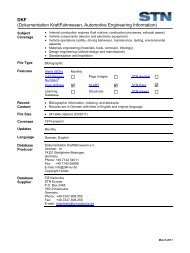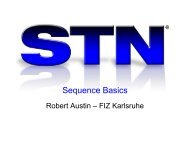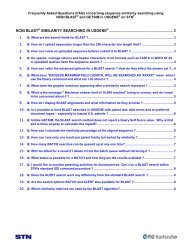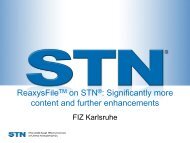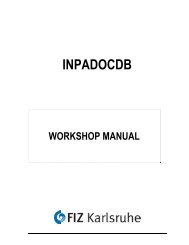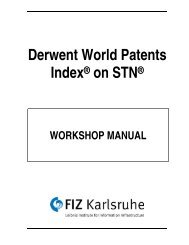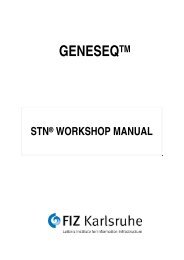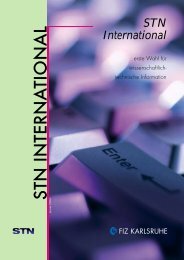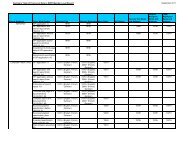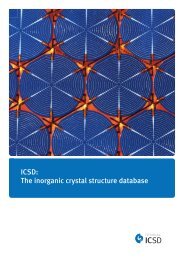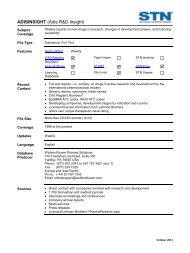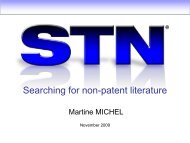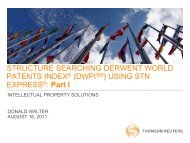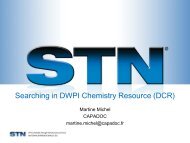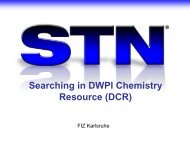Search options available in STN databases - FIZ Karlsruhe
Search options available in STN databases - FIZ Karlsruhe
Search options available in STN databases - FIZ Karlsruhe
You also want an ePaper? Increase the reach of your titles
YUMPU automatically turns print PDFs into web optimized ePapers that Google loves.
17.2 Contents of the Basic Index<br />
92<br />
Guide to <strong>STN</strong> Patent Databases<br />
Database Title(s) Abstract(s) Index<strong>in</strong>g terms Claim(s) other<br />
CAPLUS TI AB ST, IT, CT, CW, RN<br />
DWPI, BI TI, TT, AW AB (ACTN, KW, MC,<br />
<strong>Search</strong><strong>in</strong>g only <strong>in</strong> fields of the<br />
ACTV, ADV, PLE, CMC (for<br />
<strong>in</strong>vention level (ABEQ is part<br />
ALE, DETD,<br />
DRWD, NOV,<br />
UADV, USE),<br />
TECH, ABEQ,<br />
ABEX, ABDT<br />
subscriber)<br />
of the publication level)<br />
DWPI, BIEX TIDE, TIEN, ABDE, ABEN,<br />
MCLM (CLM) <strong>Search</strong><strong>in</strong>g only <strong>in</strong> fields of the<br />
TIES, TIFR ABFR<br />
publication level<br />
EPFULL TI AB all Claims DETD<br />
IFIPAT TI AB RN all Claims GOVI, BOTI, GI, NTE, PARN<br />
INPADOCDB / TI AB (AB, ABDE,<br />
INPAFAMDB<br />
ABFR, ABES,<br />
ABOL)<br />
JAPIO TI AB<br />
PATDPA TI AB MCLM s<strong>in</strong>ce<br />
1996<br />
PATDPAFULL TI AB all Claims DETD<br />
PCTFULL TI AB all Claims (only<br />
for doc. <strong>in</strong> en,<br />
de, fr, and es)<br />
DETD<br />
RDISCLUSURE TI Full Text<br />
USPATFULL/ TI AB ST, IT, RN from CA all Claims SUMM, DETD, DRWD, PARN,<br />
USPAT2<br />
GOVI<br />
17.3 Notes on all <strong>databases</strong><br />
Text search<strong>in</strong>g can be done <strong>in</strong> all <strong>databases</strong> <strong>in</strong> the Basic Index (/BI or without a SEARCH qualifier). The searched<br />
terms can be entered <strong>in</strong> a truncated form:<br />
=> S SENSOR?<br />
L1 9491 SENSOR?<br />
The follow<strong>in</strong>g types of truncation can be used:<br />
? replaces any number of characters (or none) at the end of the search term or at the beg<strong>in</strong>n<strong>in</strong>g <strong>in</strong> the case of<br />
left-hand truncation<br />
# replaces one character or none at the end of the search term<br />
! replaces exactly one character <strong>in</strong> the middle or at the end of the search term<br />
In addition to the Boolean operators AND, OR and NOT, Proximity operators may be used. These types of<br />
proximity are <strong>available</strong> for text search<strong>in</strong>g:<br />
order.<br />
terms are adjacent (with a spac<strong>in</strong>g of 1, 2 ... words, or not) <strong>in</strong> the specified<br />
terms are adjacent (with a spac<strong>in</strong>g of 1, 2 ... words or not), <strong>in</strong> any order.<br />
(T) the terms are connected, the terms may be written <strong>in</strong> one word (T) or have a<br />
space (1T) or hyphen (1T) or even another term (2T) between them, e.g.<br />
?micro? (2T) ?mechanical? would f<strong>in</strong>d e.g. micromechanical, microelectromechanical, micro<br />
mechanical, micro electromechanical, micro-electro-mechanical ;<br />
?anti? (1t) ?allerg? would f<strong>in</strong>d e.g. anti-allergic, antigen, allergen, quantify<strong>in</strong>g allergens<br />
(sometimes this does not work at l<strong>in</strong>e breaks)<br />
(S) terms are adjacent <strong>in</strong> the same sentence/subunit (e. g. pairs of descriptors) or <strong>in</strong> the same paragraph of<br />
text (DWPI, <strong>in</strong>vention level).



